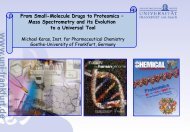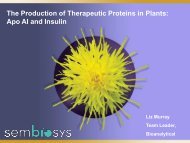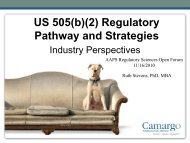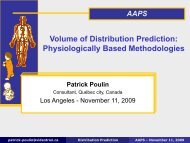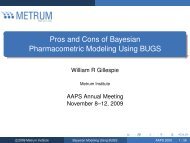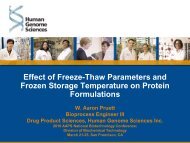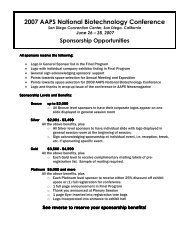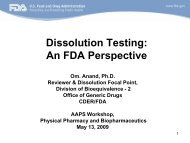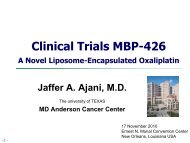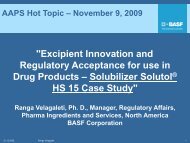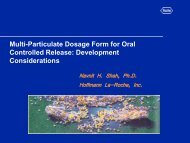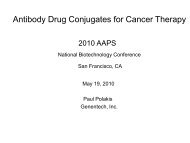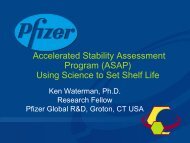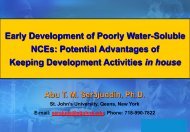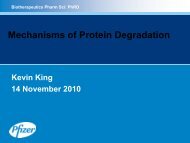Preliminary Program - American Association of Pharmaceutical ...
Preliminary Program - American Association of Pharmaceutical ...
Preliminary Program - American Association of Pharmaceutical ...
You also want an ePaper? Increase the reach of your titles
YUMPU automatically turns print PDFs into web optimized ePapers that Google loves.
81<br />
2009 AAPS Annual Meeting and Exposition<br />
AAPS Regulatory Sciences (RS) <strong>Program</strong>ming<br />
Moderators<br />
Carryn Purdon, Ph.D.<br />
Nycomed<br />
Chinmay Shukla, Ph.D.<br />
U.S. Food and Drug Administration<br />
Microdialysis in Skin: Overview and<br />
Comparison with Other Techniques<br />
Chris D. Anderson, M.D.<br />
Linköping University<br />
Microdialysis in the Selection <strong>of</strong> Optimal<br />
Formulations for Iontophoretic Drug Delivery<br />
Grazia Stagni, Ph.D., M.S.<br />
Long Island University<br />
Determination <strong>of</strong> Drug Penetration in<br />
Diseased Skin<br />
Speaker to be Determined<br />
The Regulatory View Point<br />
Edward Bashaw, Pharm.D., invited<br />
U.S. Food and Drug Administration<br />
Thursday, November 12, 2009<br />
OPEN FORUMS<br />
1:30 pm – 5:00 pm<br />
Global Regulatory Challenges for<br />
Genotoxic Impurities<br />
AAPS Regulatory Sciences (RS) Open Forum<br />
An additional fee is required to attend this open forum<br />
Controlling the quality <strong>of</strong> medicines is one <strong>of</strong> the<br />
critical aspects <strong>of</strong> assuring safety and efficacy<br />
<strong>of</strong> pharmaceutical products. The International<br />
Conference on Harmonization (ICH) has published<br />
general guidance (Q3A) on the quality and safety<br />
assessment <strong>of</strong> impurities in pharmaceutical<br />
drug substances and drug products but is not<br />
specific to Genotoxic impurities. The European<br />
Medicines Agency (EMEA) has published a guideline<br />
focusing on limits for genotoxic impurities, and<br />
the U.S. Food and Drug Administration (FDA) has<br />
recently issued draft guidance on genotoxic and<br />
carcinogenic impurities in drug substances and<br />
drug product. These guidance documents have<br />
many similarities including limits based on a<br />
Threshold <strong>of</strong> Toxicological Concern (TTC) derived<br />
from animal carcinogenicity data to estimate a<br />
daily dose (1.5 µg/day) for genotoxic/carcinogenic<br />
impurities in human medicines. There are however<br />
differences including the FDA mandated genotoxic<br />
testing <strong>of</strong> impurities above the ICH qualification<br />
threshold, even in the absence <strong>of</strong> structural alerts.<br />
Presentation <strong>of</strong> the TTC as a single figure infers<br />
an unwarranted level <strong>of</strong> control and supports the<br />
adoption <strong>of</strong> a more flexible approach by regulatory<br />
authorities when evaluating new drug products.<br />
Furthermore, the limit is based on 70 years <strong>of</strong><br />
continuous daily exposure, a scenario that is<br />
uncommon for most medicines and not applicable<br />
to the pre-registration clinical development phase.<br />
To address this latter point, a staged TTC has been<br />
developed that proposes limits based on shorter<br />
durations <strong>of</strong> treatment, e.g., up to 1 year. Based on<br />
recent history, this approach has been acceptable<br />
to some authorities but not to others. This Open<br />
Forum will address these challenges by reviewing<br />
the current regulatory views from the US and EU and<br />
how industry has applied recent guidance globally to<br />
drug candidates in development and on established<br />
products. Questions that could be addressed in<br />
the open forum include; will a shortened duration<br />
<strong>of</strong> therapy allow for increased regulatory flexibility?<br />
How can in silico tools be leveraged when control<br />
strategies for genotoxics are developed? How will<br />
the current guidances be applied to innovative<br />
dosage forms (trans-dermals, depots, etc.)? What<br />
are the practical challenges to achieving TTC levels<br />
(including manufacturing processes and analytical<br />
method limitations? Should controls be different for<br />
pediatric medicines? An Expert Panel would facilitate<br />
discussion for at least 60 minutes. The discussion<br />
from the forum could be captured in a variety <strong>of</strong><br />
publications, including the AAPS Journal, the DIA<br />
Journal, or Regulatory Rapporteur.<br />
Moderators<br />
Stephen Colgan, Ph.D.<br />
Pfizer Global Research & Development<br />
Ganapathy Mohan, Ph.D.<br />
Merck and Co., Inc.<br />
Control <strong>of</strong> Genotocix Impurities and the<br />
Regulatory Impact <strong>of</strong> this: A Case Study<br />
Ganapathy Mohan, Ph.D.<br />
Merck and Co., Inc.<br />
Continuing Challenges <strong>of</strong> GTIs<br />
Gopi Vudathala, Ph.D.<br />
San<strong>of</strong>i-Aventis<br />
FDA Point <strong>of</strong> View<br />
David Jacobson-Kram, Ph.D., invited<br />
U.S. Food and Drug Administration<br />
E.U. Point <strong>of</strong> View<br />
Peter Kasper, Ph.D.<br />
Federal Institute for Drugs and Medical Devices<br />
Panel Discussion: Regulatory Queries and<br />
Strategies Related to Genotoxics for NCES,<br />
Generics, and Established Products<br />
Facilitator<br />
Stephen Colgan, Ph.D.<br />
Pfizer Global Research and Development<br />
1:30 pm - 5:00 pm<br />
Biosimilars-Development<br />
Considerations and Future Directions<br />
AAPS Biotechnology Section (BIOTEC) and<br />
Regulatory Sciences (RS) Open Forum<br />
An additional fee is required to attend this open forum.<br />
As global sales for biologic products is on the<br />
rise, this market represents an attractive target<br />
for generic companies. The approaches related to<br />
biosimilar products in the various regions across<br />
the world are divergent, with a clear need for<br />
defining regulatory expectations for these products<br />
at the global level. In the USA, legal pathways<br />
exist for review and approval <strong>of</strong> some smaller,<br />
well characterized proteins such as human growth<br />
hormone and insulin, which are regulated under<br />
the Federal Food, Drug, & Cosmetic Act; however,<br />
for other biotherapeutics such as interleukins<br />
and interferons, which are regulated under the<br />
Public Health Service Act (PHSA), there is currently<br />
no abbreviated authorization pathway. However,<br />
there are signs <strong>of</strong> some momentum in this regard,<br />
with the recent support expressed by the Obama<br />
administration, and proposed legislation H.R.<br />
1427 “Promoting Innovation and Access to Life-<br />
Saving Medicines Act.” recently introduced by a<br />
bipartisan group <strong>of</strong> Congressional representatives<br />
that would open the door to approval <strong>of</strong> biosimilar<br />
products. Contrary to the USA a legal framework for<br />
biosimilars exists in the EU since the review <strong>of</strong> EU<br />
legislation. The first biosimilar product in the EU<br />
was Somatotropin / Sandoz (Omnitrope ® ). Countries<br />
such as China, India and South Korea also have<br />
reported a high number <strong>of</strong> licensed biosimilars<br />
within their existing regulatory framework. Examples<br />
<strong>of</strong> such products marketed in these countries<br />
include interleukins, interferons, erythropoietins,<br />
growth factors, hormones, enzymes and monoclonal<br />
antibodies. This is expected to be a topic that will<br />
be a center <strong>of</strong> debate between legislators, the<br />
biotechnology and generic industry. The open forum<br />
will feature experts who will address the regulatory<br />
framework for approval <strong>of</strong> biosimilars in the key<br />
regions, and address challenges and considerations<br />
for development <strong>of</strong> these products.<br />
Moderator<br />
Deepa Deshpande, Ph.D.<br />
Universal Regulatory, Inc.<br />
E.U. Considerations<br />
Marie-Christine Bielsky, M.D.<br />
Medicines and Healthcare Products Regulatory<br />
Agency (MHRA)



